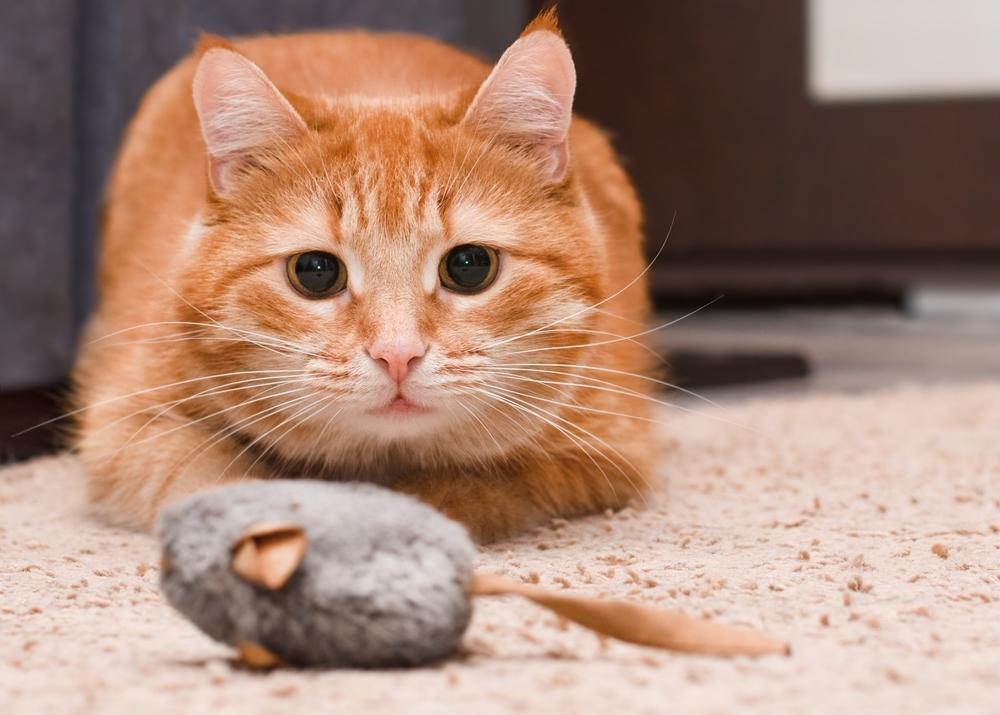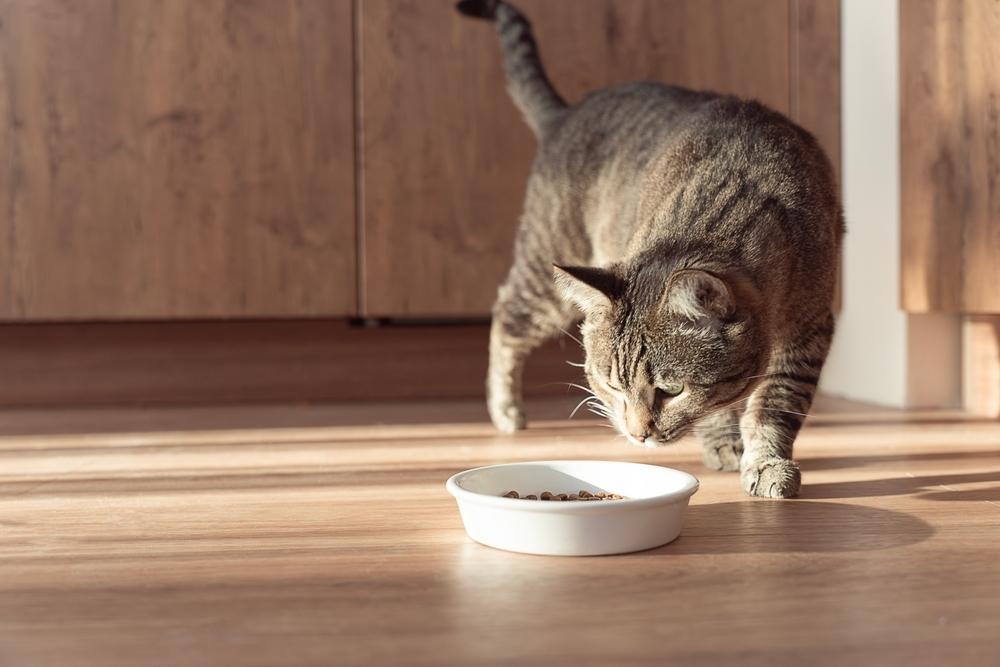

The U.S. consumer market for vitamins and supplements is growing rapidly, and not just for humans. With cat vitamins and supplements posed to combat every feline ailment imaginable, you may wonder whether vitamins for cats are safe, if they work and whether you really need to supplement your cat's nutrition. Here's what you should know about key nutrients for health and well-being, including essential cat food ingredients and the importance of balance when it comes to choosing the best cat food for your kitty.
Balancing Your Cat's Nutritional Needs
Cats have specific nutrient needs based upon their life stage. While balance can vary, cats' core nutritional needs include:
Water
Protein
Fat
Carbohydrates
Vitamins
Minerals

The Three Pillars: Protein, Fats and Carbohydrates
Protein, fat and carbohydrates support energy, growth, metabolism and healthy immune system function among other key functions.
Protein
Cats require high levels of protein, with slight variation depending upon age, activity level and health status. The building blocks of protein, cats need amino acids in specific amounts and ratios to ensure the body can build tissue and form hormones and enzymes to support metabolism. Most essential amino acids are found in both animal- and plant-derived proteins except for taurine, which is only found in animal proteins. Without sufficient levels of taurine, cats can develop heart disease as well as vision and dental issues.
To ensure the right amount of each amino acid, foods for kittens, pregnant cats and nursing cats should generally contain a minimum of 30% high-quality protein.
Fats
Despite being obligate carnivores, cats need more than protein to survive. Fats are a source of essential fatty acids and facilitate the absorption, storage and transport of fat-soluble vitamins A, D, E and K. They're also crucial for cell membrane integrity and skin and brain health. True to their carnivore nature, cats require the specific omega-6 fatty acid arachidonic acid, which is absent in vegetable sources and found in meat, poultry and eggs.
Because fat is more calorie-dense, it's carefully balanced with other nutrients in cat food to ensure complete nutrition.
Carbohydrates
The term "carbohydrate" includes all sugars, starches and fibers in cat food. Cats can readily digest sugars and starches for energy, which comes in the form of glucose — the only energy source used by brain tissue and red blood cells.
Fibers are commonly divided into two types: soluble and insoluble. Soluble fibers are readily fermented in the gut and, depending on the type, can help feed your cat's microbiome. Insoluble fibers can absorb water to promote gut motility and healthy stools.
Grains, fruits and vegetables contain all three types of carbohydrates in differing amounts. Carbohydrate sources in cat foods can be carefully balanced to ensure cats get the energy and fibers they need to thrive.
Cat Vitamins and Minerals: What Vitamins Do Cats Need?
Cats and kittens have unique vitamin requirements — one of the reasons a cat can't survive on dog food long term. Here are some of their required vitamins and minerals.
Vitamin A for Cats
Unlike dogs and people, cats lack the enzyme that converts beta-carotene into vitamin A. Therefore, the active form of vitamin A must be provided to cats. Beta-carotene for cats is included in food as an antioxidant, not to fulfill their vitamin A requirement.
Vitamin A helps cats with their keen night vision and supports growth, reproduction and healthy skin and coat. However, cats can have too much. Vitamin A toxicity poses serious health risks, so never supplement your cat with vitamin A unless directed by your veterinarian.
Vitamin B for Cats
Cats require seven B vitamins, and they must be supplemented through food. B vitamins support cats' health in various ways. For example, vitamin B3, or niacin, is added to cat food for growth and metabolism. Vitamin B12 for cats — also known as cobalamin, which only comes from animal sources — helps produce red blood cells and promotes healthy nerve and brain function. Cats with intestinal diseases or malabsorption conditions may become deficient in vitamin B. However, oral supplementation is usually ineffective in these cases.

Vitamin C for Cats
Since cats can synthesize vitamin C, there's no official dietary requirement for it. However, manufacturers may add this vitamin to cat food for its antioxidant and preservative properties. Excess vitamin C supplementation has been linked to bladder stones in cats, which is why foods made specifically for stone dissolution should not contain vitamin C.
Vitamin D for Cats
Vitamin D helps cats absorb and use calcium and phosphorus, which helps maintain bone and overall health. Unlike humans, cats can't make vitamin D efficiently when exposed to sunshine, so it needs to be added to food. Oversupplementation can lead to calcification of kidneys, blood vessels and heart valves.
Vitamin E for Cats
As an antioxidant, vitamin E supports healthy immune response, protects cells and helps reduce the risk of heart and muscle diseases.
Minerals for Cats
According to their life stage, sodium, potassium, calcium, phosphorus, magnesium, iron, zinc, copper, iodine, fluorine, selenium and chromium are part of a cat's necessary nutrition. Kittens need calcium and phosphorus in higher proportions than older cats to promote healthy bone growth.
Vitamin Supplements for Cats
As you become more accustomed to supplements for your own health, it's only natural to wonder if you should offer your feline friend a cat multivitamin. However, the bottom line is that cats require carefully balanced ratios of these vitamins and nutrients. Supplements can throw off this balance and put your cat at risk of various health concerns. Offering your cat a complete and balanced cat food for their life stage will provide them with all the nutrients they need.
While certain chronic disease conditions (such as cat kidney failure) or life stages (such as kittenhood) may require tailored nutrition, never offer supplements to your cat without a veterinarian's approval and guidance. Your vet can help you find a food formulated for your cat's needs and recommend supplementation if and when needed.
Understanding the Role of Vitamins for Cats in Balanced Nutrition
Today's house cat has a notably longer lifespan than previous generations thanks to responsible pet parentship and advanced veterinary care and nutrition. Commercially available cat foods offer complete and balanced nutrition, including vitamins and minerals in the proper proportions. If your cat has a unique nutritional need, your vet can guide you in the right direction.
You can help ensure a healthy life for your cat by seeking veterinary advice, educating yourself on feline nutrition and carefully monitoring your cat's waistline, activity level and habits throughout their years.






















